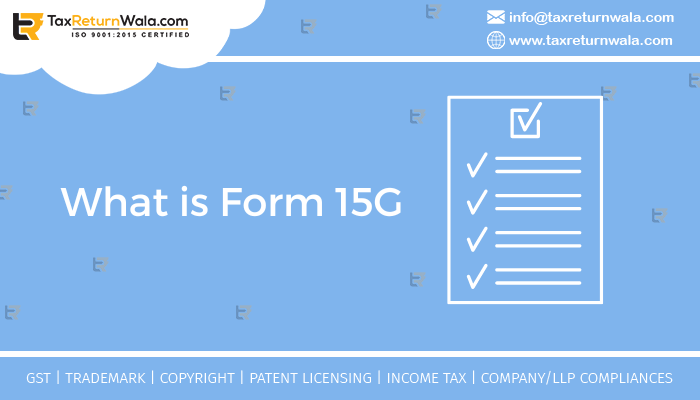What is Form 15G
Filing Form 15G
There can be a situation when you are asked to submit Form 15G in the bank for non-deduction of TDS (Tax deducted at Source) from your interest income from fixed deposits. Form 15G is a declaration that is essential to be submitted by Fixed deposit holders to the bank for requesting not to deduct TDS from the interest earned by him during the year. The declaration is submitted in a particular format duly filled with all details of the beneficiary.
Banks in India are required to deduct TDS from the interest income of an individual from fixed deposits as per Section 194A of the Income Tax Act, 1961. Similarly, some TDS deductions are made by organizations like EPFO (Employee Provident Fund Organisation), insurance companies, post offices, corporates issuing bonds, and rental service providers. These organizations charge TDS as per different TDS sections against which Form 15G is required to avoid such TDS deductions.
Here is all you need to know about Form 15G
What is Form 15G?
Form 15G is a declaration submitted by an individual to another person/organization for requesting not to deduct TDS against interest income or other benefits raised by him considering his income to be under the basic exemption limit. The form can be filed or can be obtained online through different bank websites.
For avoiding TDS, Form 15G as per Income Tax Act 1961 is filed by a taxpayer who is below the age of 60 years. For those who are above the age of 60 years (senior citizens) Form 15H has been prescribed.
What is the purpose of Form 15G?
Form 15G is required to request the bank or the TDS deducting entity not to deduct TDS on specific benefits (interest on FD deposits, Post office deposits, rent receipt, etc.) received. The purpose of Form 15G is to save the taxpayer from implications of TDS deduction with the tax department if the total income is below the tax exemption limit.
How to check Form 15G eligibility?
Form 15G holds specific eligibility criteria which have to be followed before issuing it to any TDS deducting entity. To issue Form 15G, the following eligibility has to be met:
- The issuer’s age should be less than 60 years.
- Only Resident Individuals or HUF can issue.
- Total Income should be less than the basic tax exemption limit.
- The total estimated tax on the income of the taxpayer should be zero.
- The issuer is a holder of a Permanent Account Number (PAN).
What is the process of filing Form 15G online?
Form 15G can be obtained or filled manually from the official website of the bank deducting TDS or the respective organization. The required form can also be downloaded from the thee-filing tax portal of Income tax. For filling the information in the form, there are two sections:
Section 1: Details of Tax Payer
- Name
- PAN
- Financial Year
- Residential Status
- PIN Code
- Estimated Total Income for the Year
- Details related to payment (EPFO number, FD details or Insurance Policy details, etc.).
Section 2: Details of Deductor
The Second part of the form is to be filled by the deductor stating the name, UIN, PAN, Amount of Income, and details of tax to be deposited to the government.
When to issue Form 15G?
- TDS on Interest of Fixed Deposit: When interest on fixed deposits is more than the exempted limit (Rs 40000) the form is to be submitted to the bank for TDS Deduction by the bank.
- For EPF / PF Withdrawal: If the amount of EPF (Employee provident fund) is to be withdrawn by the employee before 5 years, TDS deduction can be avoided by issue of Form 15G by the employee.
- For Post office Deposits Interest: For withdrawals out of post office deposits or National saving schemes of the post office, Form 15G can be issued to avail TDS free withdrawals.
- TDS on income from debentures/bonds: Income received by way of interest or dividend from debentures or bonds above Rs 5000 is subject to TDS Deduction. Form 15G can be issued towards such deductor to avoid TDS deduction.
- Deduction on Insurance Policy receipts: As per Section 194DA of the IT Act, proceeds received above Rs 1 lakh will be subject to TDS deduction, and hence Form 15G is to be issued to the insurance company for avoiding such deduction.
- TDS on Rental Income: On receipt of rental income above the tax exemption limit, then form 15G is issued for avoiding TDS deduction by the issuer.
What penalties are there for non-submission/invalid submission of Form 15G?
In case of Form 15G is not submitted TDS shall be deducted at the prescribed rate by the deductor. In case false information is submitted under this form, then as per Section 277 of the Income-tax Act, 1961 the person shall be convicted for:
- Imprisonment for 6 months to even 7 years for evading tax payable above Rs 25 lakhs.
- Imprisonment for 3 months to 2 years along with a fine.
If case you have any queries related to TDS E-filing or the issue of Form 15G / Form 15H, you can contact us at info@taxreturnwala.com.


